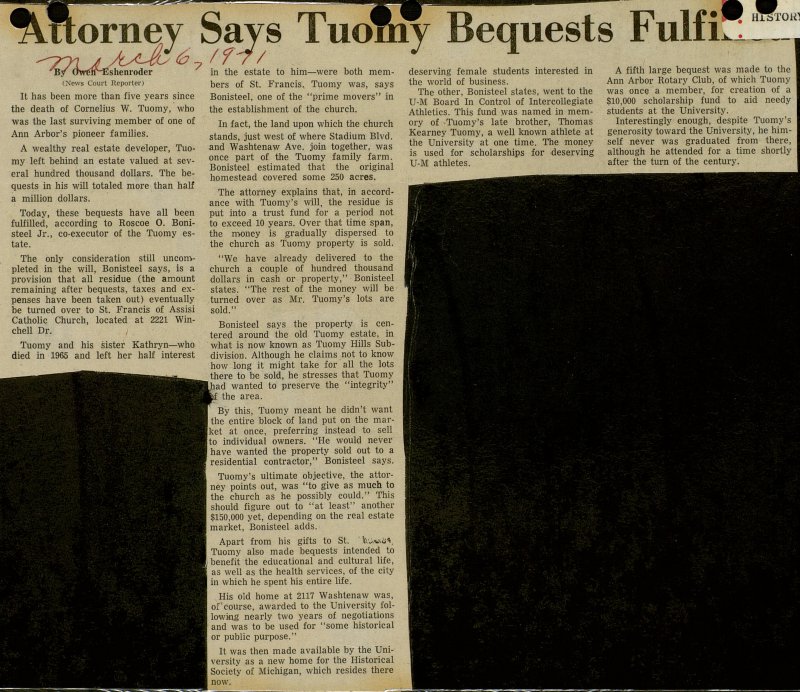Attorney Says Tuomy Bequests ...


It has been more than five years since the death of Cornelius W. Tuomy, who was the last surviving member of one of Ann Arbor's pioneer families. A wealthy real estáte developer, Tuomy left behind an estáte valued at several hundred thousand dollars. The bequests in his will totaled more than half a million dollars. Today, these bequests have all been fulfilled, according to Roscoe O. Bonisteel Jr., co-executor of the Tuomy estate. The only consideration still uncompleted in the will, Bonisteel says, is a provisión that all residue (the amount remaining after bequests, taxes and expenses have been taken out) eventually be turned over to St. Francis of Assisi Catholic Church, located at 2221 Winchell Dr. Tuomy and his sister Kathryn- who died in 1965 and left her half interest in the estáte to him- were both members of St. Francis. Tuomy was, says Bonisteel, one of the "prime movers" in the establishment of the church. In fact, the land upon which the church stands, just west of where Stadium Blvd. and Washtenaw Ave. join together, was once part of the Tuomy family farm. Bonisteel estimated that the original homestead covered some 250 acres. The attorney explains that, in accordance with Tuomy's will, the residue is put into a trust fund for a period not to exceed 10 years. Over that time span, the money is gradually dispersed to the church as Tuomy property is sold. "We have already delivered to the church a couple of hundred thousand dollars in cash or property," Bonisteel states. "The rest of the money will be turned over as Mr. Tuomy's lots are sold." Bonisteel says the property is centered around the old Tuomy estáte, in what is now known as Tuomy Hills Subdivisión. Although he claims not to know how long it might take for all the lots there to be sold, he stresses that Tuomy [had wanted to preserve the "integrity" By this, Tuomy meant he didn't want the entire block of land put on the market at once, preferring instead to sell to individual owners. "He would never have wanted the property sold out to a residential contractor," Bonisteel says. Tuomy's ultímate objective, the attorney points out, was "to give as much to the church as he possibly could." This should figure out to "at least" another $150,000 yet, depending on the real estáte market, Bonisteel adds. Apart from his gifts to St. ' k;..üV Tuomy also made bequests intended to benefit the educational and cultural life, as well as the health services, of the city in which he spent his entire life. His old home at 2117 Washtenaw was, of'course, awarded to the University followkxg nearly two years of negotiations and was to be used for "some historical or public purpose." It was then made available by the University as a new home for the Historical Society of Michigan, which resides there now. deserving female students interested in the world of business. The other, Bonisteel states, went to the U-M Board In Control of Intercollegiate Athletics. This fund was named in memory of Tuomy's late brother, Thomas Kearney Tuomy, a well known athlete at the University at one time. The money is used for scholarships for deserving U-M athletes. A fifth large bequest was made to the Ann Arbor Rotary Club, of which Tuomy was once a member, for creation of a $10,000 scholarship íund to aid needy students at the University. Interestingly enough, despite Tuomy's generosity toward the University, he himself never was graduated f rom there, although he attended for a time shortly after the turn of the century. The actual estáte consisis 01 appruximately two acres of land in addition lo the attractive, 115-year-old converted farmhouse, which is furnished in the I torian style. Unofficial estimates of the home's resale valué have ranged up to j $400,000. Among numerous small bequests which Tuomy made to former employés and associates were four sizeable bequests, Bonisteel says. He left a total of $150,000 to,St. Joseph Mercy Hospital; $50,000 of which was provided to help deserving student nurses receive medical training, and $100,000 of which went toward research m the area of intensive patiënt care or radiology programs to be conducted there. The University received two separate bequests of $50,000 each, to be used for scholarship funds. One went to the School of Business Administration for creation of the Kathryn G. Tuomy Fund, to assist